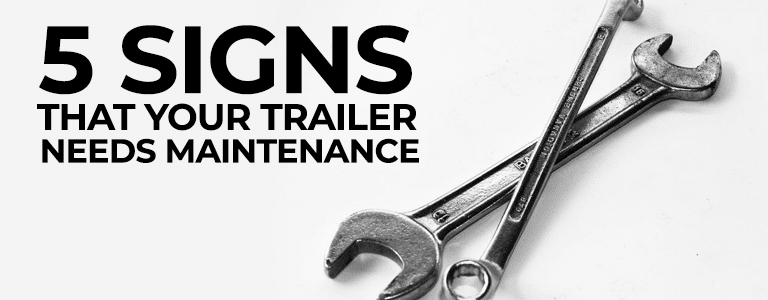
December 15, 2020 Last updated on June 16, 2023 by Bob Fisher Bob Fisher Aluminum Trailers
Maintenance is key to taking care of your equipment. Even with the best care, your custom aluminum trailer may still have issues that need to be fixed for wear and tear or overuse. Paying attention to the signs that your trailer needs repair can save you time, stress and money by getting your trailer fixed before it just breaks down on the job. Don’t ignore small differences in how your trailer operates. You don’t have to be a specialist in trailers to recognize these signs of problems that your trailer needs maintenance.
As a general rule, your trailer shouldn’t make a lot of excess noise. If you hear a new noise when you’re hauling something, it could be as simple as not having your equipment tied down tightly. It could also be something broken on the trailer. Stop and try to find what’s making the noise before travelling too far. Even if it’s not your vehicle’s engine, rattling or clicking can be troublesome.
If you see grease around the trailer, you may have a problem that needs repair. Self-greasing axles are common in many trailers. Trailers with self-greasing axles have a small chamber that collects the extra grease. If the chamber leaks, grease gets on the ground. Small leaks aren’t necessarily an emergency, but it may lead to more trouble down the road. If you’re seeing any kind of liquid around your trailer, get it checked out.
If you’re finding it difficult to maneuver your trailer or turn it, you are probably facing some kind of maintenance. It could be a problem with the axles or other connections. Your trailer shouldn’t be hard to turn or maneuver. You may just need to replace a part, or you may need to make major repairs, but don’t wait to check out the problem.
You may bang up your trailer when you’re backing up against structures. Trailers can crack as they age. Dents occur when other equipment bangs up your trailer. Regardless of how the trailer got dinged or bent, these dents can cause your trailer’s structure to weaken. After an accident, you should look for cracks and dents in the trailer. You should inspect your trailer for weaknesses to avoid breakdowns when you’re hauling a load of stuff.
A loaded trailer isn’t going to be the quietest and smoothest ride, but it shouldn’t shake or be unevenly bumpy. If you’re experiencing a lot of bumps and shifts while you’re hauling a trailer, it could be a suspension issue. It could also be as simple as debris under the trailer. Check it out before travelling too far, because you could end up with a serious problem.
Taking care of small problems before they become large issues will save you money and time. Your trailer should last 10 to 15 years if you take care of it. When you take it out in the spring, check its systems for winter damage. Replace tires as the tread wears down. At the end of the season, make sure you store your trailer to prevent damage. Clean it up to avoid corrosion from dirt and grime. Replace worn out wires and connectors for safety. When you notice something that doesn’t seem right, check it out before the problem gets worse. Know when you should replace your trailer before you end up breaking down on an important job.
In the market for a new custom aluminum trailer? Find out more about our utility trailers and how we can help design a trailer that fits your needs and does the job you want it to.